respiratory support
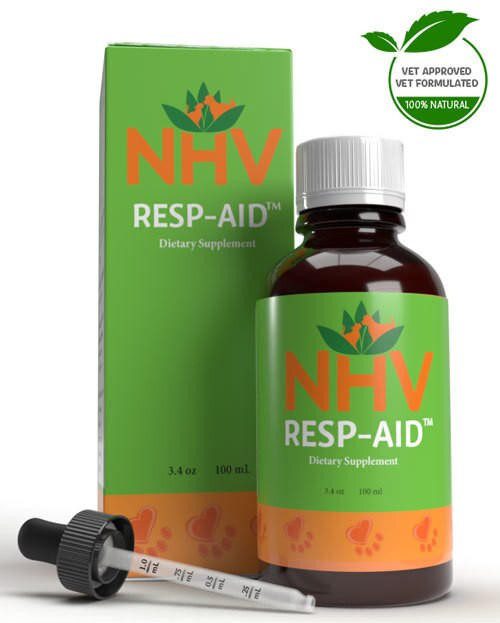
free shipping over $100 (USA & Canada)
1-877-937-4372 the pet expert hotline
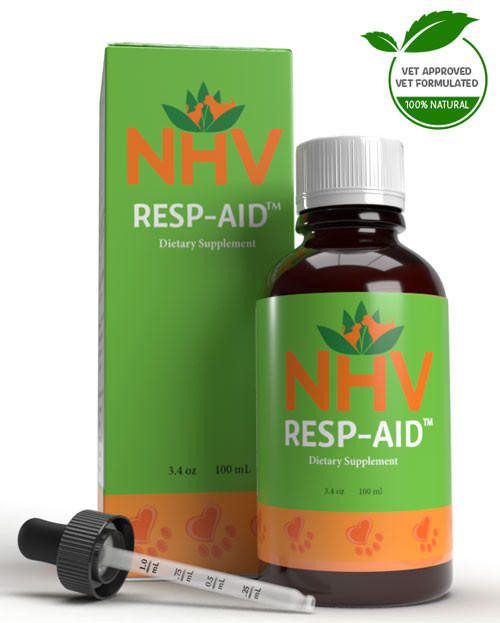
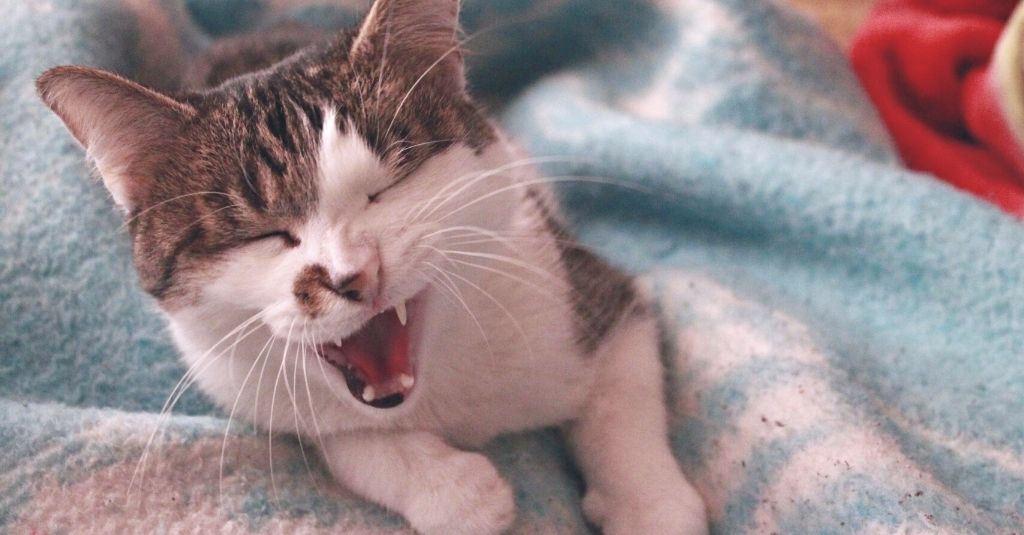
When you hear your pet start coughing and sneezing, it can be concerning. There are many potential causes of coughing and sneezing in dogs and cats and the severity can be indicated by factors such as their frequency and the pet’s age, for instance. In this blog, I will talk about symptoms to keep note of, when you should visit the vet, common causes, and natural support.
These symptoms can be caused by a variety of factors.
Since these symptoms can be caused by a variety of factors, a thorough history and physical examination made by a veterinarian can help decide which ones are most likely to be affecting your little one. An examination can also help the vet decide which diagnostic tests will be the best to recommend and which therapies are most likely to be effective. If your pet is coughing or sneezing frequently for more than a few days, a visit to the vet is highly recommended.
The information that you share with the veterinarian can also be very helpful in pinpointing the cause of coughing and/or sneezing in your little one. Keep note of information such as the nature of the cough and/or sneeze, when it occurs, and if anything brings on these symptoms.
For instance, pets with disorders such as heart conditions, collapsing trachea, and edema in the lungs tend to cough more at night than during the day. The pet can also cough following a period of excitement, exercising, drinking water, eating. This kind of information can indicate if the issue might be located in the trachea, heart, or esophagus, for instance.
Sometimes, the cough can be moist, which could indicate accumulation of fluid in the airways or in the lungs and some coughs can also be dry. Infectious diseases, bacterial and fungal infections of the lungs, asthma, and parasites (such as heartworms) can also cause these symptoms. It is important to test your little one for those as well to rule them out.
Tests that may be recommended to identify the cause of coughs and sneezes can include different blood tests, stool exams, radiography (X-rays), ultrasound, electrocardiogram, and bronchoscopy, among others.
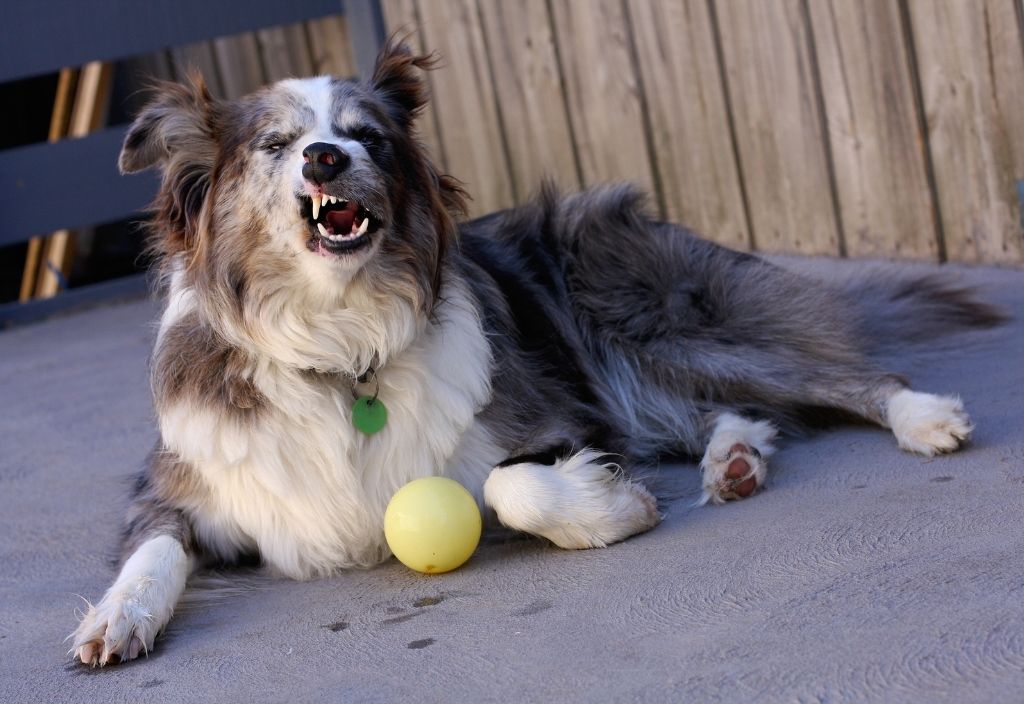
As mentioned above, medical examination and testing are needed to determine the cause of coughing and sneezing, but here are some conditions that are often related to these symptoms.
Tracheal collapse is a condition that occurs mostly in middle-aged or senior, or overweight, small breed dogs. Tracheal collapse is rare in cats. The cough is often described as sounding like a “goose honking” and the treatment often includes weight reduction, the use of cough suppressants, and some sedatives. Surgery can also be indicated in some cases.
At NHV, we have a kit that can be very beneficial for this condition, the Collapsed Trachea Super Support kit. This kit contains four of our all-natural supplements (Resp-Aid, Turmeric, Lesstress, and Petomega 3) to support healthy breathing, help reduce uncomfortable symptoms, and promote cartilage health.
Kennel cough (or infectious tracheobronchitis) is another condition that has coughing as one of the main symptoms. It can affect both cats and dogs and can be caused by several infectious organisms, including bacteria and viruses. Some veterinarians can prescribe medication such as cough suppressants for this condition.
We have a kit that can be very helpful and that can also be used alongside the vet’s prescribed treatment, the NHV Kennel Cough Kit. This kit contains two products, Resp-Aid and Stimmune. These two supplements work together to encourage respiratory health, help fight infection, and support the immune system.
As mentioned before, coughs can be caused by heart conditions too. An enlarged heart can put pressure on the airways causing cough and a failing heart can lead to edema in the lungs.
For extra support for the heart and lungs, you can add the Cardiovascular Super Support Health kit, Resp-Aid, and Natures Immuno to their regimen. The Cardiovascular kit contains Hearty-Heart and Turmeric which both promote healthy heart and circulatory function, can help with symptoms of heart conditions such as lack of energy, and have properties that can help with inflammation and discomfort. Resp-Aid is our main supplement for respiratory support and is formulated with herbs that have properties that can be beneficial for reducing coughing. Natures Immuno is a blend of medicinal mushrooms that have benefits for many parts of the body including the heart and lungs.
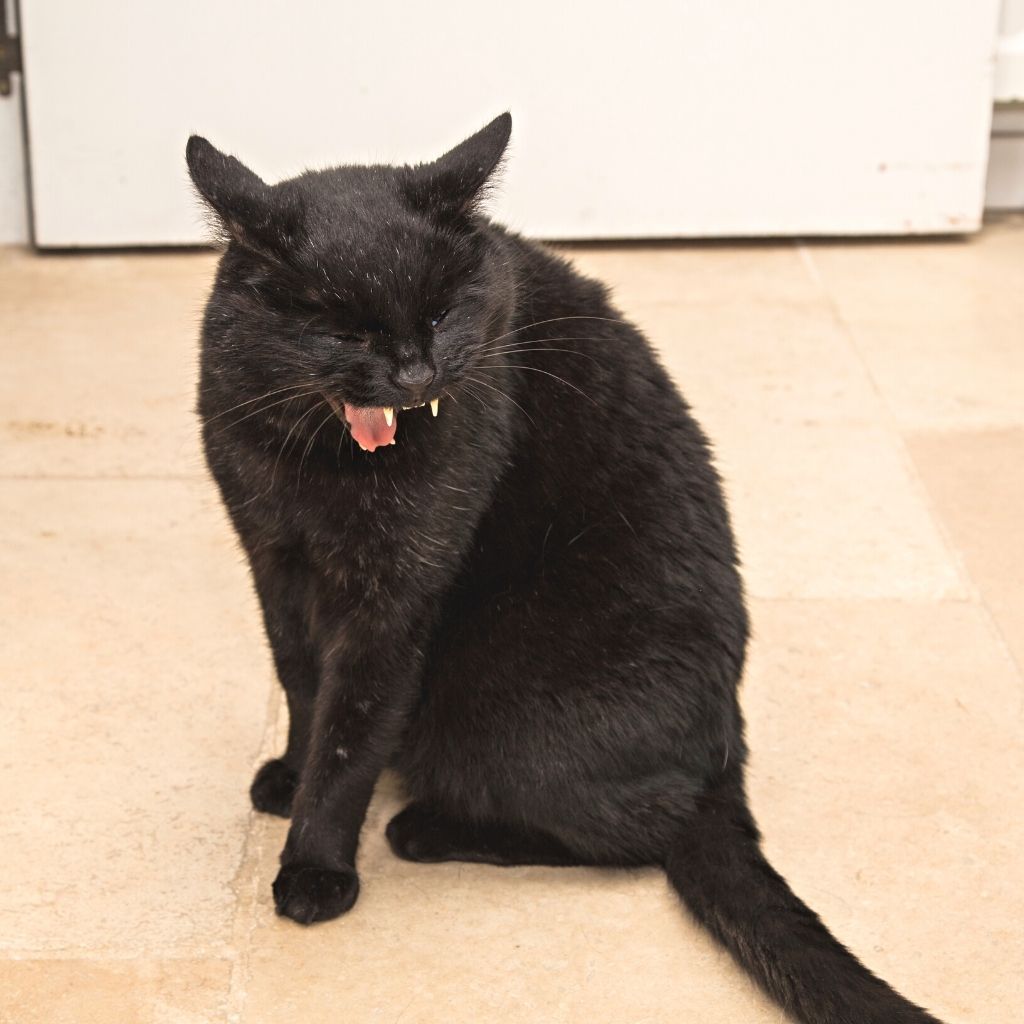
Airborne allergens are particles in the air including mold, dust, pollen, and smoke. All of these can cause allergic lung disorders, sneezing, runny nose, and coughing. For coughing caused by allergies, it’s a good idea to use Resp-Aid with Stimmune. You can also find these supplements in our Asthma Kit for Respiratory Relief.
Especially in older pets, cancer has to be considered. The lungs receive a large amount of blood that flows through the rest of the body. Lung cancers in dogs and cats most often originate from other organs and are transferred from those organs through the blood to the lungs. For these cases, it might be a good idea to add supplements such as ES-Clear (our main supplement for cancer support), Resp-Aid, and Natures Immuno to the treatment prescribed by the veterinarian.
Treatment of coughing and sneezing pets depends upon the disease diagnosed and may include different medications. Our supplements are safe to be given with prescribed medications. It’s important to keep in mind that we recommend giving the supplements 2 hours before giving the medications as this will give the body time for the tinctures to start taking effect, which will help support their body when taking pharmaceuticals.
If you have any questions don’t hesitate to reach out to our Pet Experts! You can start chatting with our Pet Expert team now by clicking the button below. We are always here for you!
respiratory support

For Coughs, Respiratory Disorders, and Bronchial Infections in Cats
buy 2 and save $3
3 month supply for a small to medium size
Powerful natural support to help your cat breath easy.
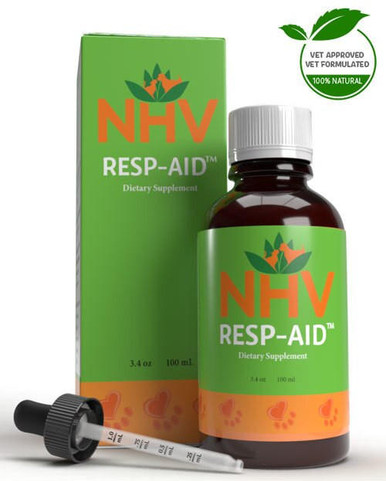
Powerful natural support to help your cat breath easy.
Many cats suffer from breathing difficulties which can lead to respiratory infections. Symptoms of respiratory infections in cats are similar to those in humans such as watery eyes, runny nose, sneezing, coughing, and difficulty breathing. Resp-Aid™ is a holistic all-natural remedy for respiratory infection in cats to help provide them relief.
NHV Resp-Aid is currently under clinical studies conducted jointly with the University of Saskatchewan and the University of Calgary. The study found that the lungs from asthmatic animals treated with Resp-Aid showed considerably less inflammation and histopathology compared with asthmatic animals lungs that did not receive Resp-Aid. You can read the latest on this innovative study here.
Some cat breeds are more susceptible to breathing difficulties such as Siamese. Find out if your cat breed is prone to breathing difficulties at NHV online breeds and conditions. Respiratory infections in cats can be caused by:
Read about a rescue kitty named Hunter and how he found relief with NHV’s remedy for respiratory infection in cats.
If you have questions about natural remedies for respiratory infections in cats or any of our plant-based products you can ask an expert at NHV. Our pet experts can offer guidance and support because NHV wants all pet parents and their fur children to breathe easy naturally.
NHV’s Resp-Aid contains a proprietary blend of nine highly effective herbs that help support healthy breathing making this a formidable remedy for respiratory infections in cats.
Select your pet's weight to determine the correct dose.
To be taken twice daily. Determine your pet’s weight and then use the easy chart below to determine the correct dose. This is the minimum dosage.
Pet's Weight Dosage
0 - 15 lb = 0.5 ml
16 - 30 lb = 1.0 ml
31 - 45 lb = 1.5 ml
46 - 60 lb = 2.0 ml
61 - 75 lb = 2.5 ml
Over 75 lb = 3.0 ml
How to Administer
Shake well before use. The easiest method is to use the dropper provide and places the drops into your pet’s food or favorite treat. You can also use the dropper and squirt directly into the pet’s mouth.
Some pets can be finicky, if this occurs consider hiding the drops in foods most pet’s love such as fish, chicken or yogurt or a favourite treat. If your pet only eats dry food then soak a few kibbles at feeding time.
For Best Results
Herbal dietary supplements are beneficial to the health and wellbeing of your pet and are safe for long-term use. Every pet responds to natural herbal supplements differently, therefore it is important to be consistent and administer the product daily. Supplements generally take two to four weeks to take effect, however this will vary from one animal to the next.
Product Storage
All NHV Natural Pet Products are pure herbal extracts and contain no artificial additives, preservatives or coloring. Shelf life after opening is 6 months and must be refrigerated after opening.
Cautions and Contraindications
Do not use in pregnant or nursing animals. Speak to your vet before using our products. A second visit is recommended if your pet’s condition does not improve, or deteriorates after continued use of the supplements.
All information provided by NHV Natural Pet Products is for educational purposes only.
Many cats suffer from breathing difficulties which can lead to respiratory infections. Symptoms of respiratory infections in cats are similar to those in humans such as watery eyes, runny nose, sneezing, coughing, and difficulty breathing. Resp-Aid™ is a holistic all-natural remedy for respiratory infection in cats to help provide them relief.
NHV Resp-Aid is currently under clinical studies conducted jointly with the University of Saskatchewan and the University of Calgary. The study found that the lungs from asthmatic animals treated with Resp-Aid showed considerably less inflammation and histopathology compared with asthmatic animals lungs that did not receive Resp-Aid. You can read the latest on this innovative study here.
Some cat breeds are more susceptible to breathing difficulties such as Siamese. Find out if your cat breed is prone to breathing difficulties at NHV online breeds and conditions. Respiratory infections in cats can be caused by:
Read about a rescue kitty named Hunter and how he found relief with NHV’s remedy for respiratory infection in cats.
If you have questions about natural remedies for respiratory infections in cats or any of our plant-based products you can ask an expert at NHV. Our pet experts can offer guidance and support because NHV wants all pet parents and their fur children to breathe easy naturally.
NHV’s Resp-Aid contains a proprietary blend of nine highly effective herbs that help support healthy breathing making this a formidable remedy for respiratory infections in cats.
Select your pet's weight to determine the correct dose.
To be taken twice daily. Determine your pet’s weight and then use the easy chart below to determine the correct dose. This is the minimum dosage.
Pet's Weight Dosage
0 - 15 lb = 0.5 ml
16 - 30 lb = 1.0 ml
31 - 45 lb = 1.5 ml
46 - 60 lb = 2.0 ml
61 - 75 lb = 2.5 ml
Over 75 lb = 3.0 ml
How to Administer
Shake well before use. The easiest method is to use the dropper provide and places the drops into your pet’s food or favorite treat. You can also use the dropper and squirt directly into the pet’s mouth.
Some pets can be finicky, if this occurs consider hiding the drops in foods most pet’s love such as fish, chicken or yogurt or a favourite treat. If your pet only eats dry food then soak a few kibbles at feeding time.
For Best Results
Herbal dietary supplements are beneficial to the health and wellbeing of your pet and are safe for long-term use. Every pet responds to natural herbal supplements differently, therefore it is important to be consistent and administer the product daily. Supplements generally take two to four weeks to take effect, however this will vary from one animal to the next.
Product Storage
All NHV Natural Pet Products are pure herbal extracts and contain no artificial additives, preservatives or coloring. Shelf life after opening is 6 months and must be refrigerated after opening.
Cautions and Contraindications
Do not use in pregnant or nursing animals. Speak to your vet before using our products. A second visit is recommended if your pet’s condition does not improve, or deteriorates after continued use of the supplements.
All information provided by NHV Natural Pet Products is for educational purposes only.
heart support
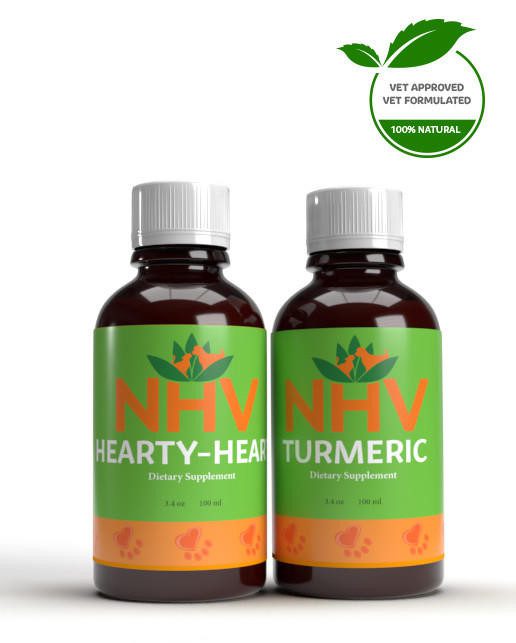
Hearty-Heart & Turmeric
bundle and save with pet expert kits
3 month supply for a small to medium size pet.
Did you know there is a natural way to help support cardiovascular or heart disease in dogs and cats? NHV Cardiovascular Super Support Health Kit offers natural support for furkiddos by managing symptoms of cardiovascular disorders. Our supplements are made with organically grown or ethically harvested (or ethically sourced) herbs.


Did you know there is a natural way to help support cardiovascular or heart disease in dogs and cats? NHV Cardiovascular Super Support Health Kit offers natural support for furkiddos by managing symptoms of cardiovascular disorders. Our supplements are made with organically grown or ethically harvested (or ethically sourced) herbs.

Seeing your little one battling cardiovascular and heart disease in dogs and cats is distressing and worrying. We understand that it is impossible just to stand and watch them suffer. That’s why our Pet Experts have bundled two natural supplements that work together and can be used alongside traditional medication as extra support for your little one.
Our Cardiovascular Super Support Health Kit can help support the cardiovascular system, alleviate heart disease symptoms, and reduce any discomfort heart conditions may cause. This bundle contains our primary support for heart health in furkiddos - Hearty Heart and Turmeric, which offers excellent antioxidant and cardiovascular support.
All our supplements are free of added preservatives, additives, flavorings, or artificial colors. They are veterinarian formulated, and have been used by pets worldwide for over twenty years.
What is Cardiovascular (Heart) Disease in Dogs and Cats?
Cardiovascular (cardiac) disease is an umbrella term for conditions in your furkid’s circulatory system (blood vessels and especially the heart). Because of this, they are also commonly known as heart diseases.
Over 10% of furkiddos have some kind of cardiovascular disease. Unfortunately, the diseases progress over time if not treated in the early stages. This may eventually lead to heart failure and may even be fatal. That’s why seeking help from veterinary cardiologists is important. You should also visit a vet as soon as you notice clinical signs of heart disease in your beloved furkid.
Symptoms of Cardiovascular (Heart) Disease in Dogs and Cats
There are many types of cardiovascular disease in dogs and cats, and they all show different, particular symptoms. The symptoms may also vary in various breeds and species.
But here are some general signs you should watch out for:
Discovering, diagnosing, and treating heart disease sooner can help minimize the damage it causes to your cat or dog’s heart. So, we would like to reiterate the importance of vet consultation and full body examination upon seeing these symptoms.
Common Cardiovascular (Heart) Disease in Dogs and Cats
Let’s learn some common types of heart disease or cardiovascular disease in dogs and cats:
Sadly, most heart disease in cats and dogs are incurable. But with treatment and natural support, you can help your little one live a longer and happier life!
How NHV Remedies Support Cardiovascular Disease in Dogs and Cats
Our Cardiovascular Super Support Health Kit can support your little one while taking vet-prescribed medication.
Hearty-Heart, as the name suggests, is our primary support for cardiovascular or heart disease in cats and dogs. The extract supports furkiddos’ cardiovascular system, promotes heart health, and helps with symptoms of cardiovascular disease. The herbs in this formula are well known to help with various heart related symptoms. For example, the herb Pulsatilla helps relieve the constant coughing, restlessness, and respiratory issues that furkids with cardiac disease may experience.
Various other herbs in the supplement, like motherwort, help strengthen your little one’s heart and circulatory system. Hawthorn, in particular, is a well-known heart and vascular tonic. It is often recommended for furriends with heart disease. This herb also may strengthen cardiovascular structures and functions. All the herbs work synergistically to create a balanced formula that is safe to use long-term to support the cardiovascular system.
Another supplement added to the kit is Turmeric. Turmeric is also beneficial for cardiovascular health. The main compound in Turmeric is called curcumin. In addition to supporting the cardiovascular system, curcumin is high in antioxidant properties and may be helpful in scavenging free radicals as well as helping to reduce inflammation.
And what does inflammation have to do with cardiac health?
Inflammation is one of the risk factors for cardiovascular disorders because it may cause blood clots. Therefore, if we reduce inflammation in our furriends, it may protect them from having cardiovascular disease too. That’s why Turmeric can serve as a proactive support for heart disease in dogs and cats.
Hearty-Heart
Turmeric
Natural Support for Cardiovascular (Heart) Disease in Dogs and Cats
NHV’s supplements are all manufactured in a GMP-certified and FDA-approved facility. In addition to that, a third-party lab has tested them for quality assurance. Therefore, you can rest assured that our products are safe for your little one.
We understand that your furbaby’s health and well-being are your top priorities. It is ours too. Because of that, we have a very dedicated and supportive team of pet experts to help. Feel free to connect with one of NHV’s pet experts if you have any questions at all!
Grappling with cardiovascular disorders can be very tough on your furkiddo. Order our Cardiovascular Super Support Health Kit right now to support their fight!
All NHV supplements are made with the finest quality organic or ethically harvested herbs. We use non-GMO vegetable glycerin as our base. NHV products are full-spectrum extracts.
Hearty-Heart
Turmeric
Select your pet's weight to determine the correct dose.
To be taken twice daily. Determine your pet’s weight and then use the easy chart below to determine the correct dose. This is the minimum dosage.
Pet's Weight Dosage For Dogs and Cats
0 - 15 lb = 0.5 ml
16 - 30 lb = 1.0 ml
31 - 45 lb = 1.5 ml
46 - 60 lb = 2.0 ml
61 - 75 lb = 2.5 ml
Over 75 lb = 3.0 ml
For ferrets: 0.5ml twice a day
For rabbits and guinea pigs: 0.5 ml twice a day
For hamsters and mice: 1 drop per two pounds twice a day
How to Administer
Shake well before use. The easiest method is to use the dropper provided and place the drops into your pet’s food or favorite treat. You can also use the dropper and squirt directly into the pet’s mouth. Some pets can be finicky, if this occurs consider hiding the drops in foods most pet’s love such as fish, chicken or yogurt or a favorite treat. If your pet only eats dry food then soak a few kibbles at feeding time.
For Best Results
Herbal dietary supplements are beneficial to the health and well-being of your pet and are safe for long-term use. Every pet responds to natural herbal supplements differently, therefore it is important to be consistent and administer the product daily. Supplements generally take two to four weeks to take effect, however this will vary from one animal to the next.
Product Storage
All NHV Natural Pet Products are pure herbal extracts and contain no artificial additives, preservatives or coloring. Shelf life after opening is 6 months and must be refrigerated after opening.
All information provided by NHV Natural Pet Products is for educational purposes only.
Seeing your little one battling cardiovascular and heart disease in dogs and cats is distressing and worrying. We understand that it is impossible just to stand and watch them suffer. That’s why our Pet Experts have bundled two natural supplements that work together and can be used alongside traditional medication as extra support for your little one.
Our Cardiovascular Super Support Health Kit can help support the cardiovascular system, alleviate heart disease symptoms, and reduce any discomfort heart conditions may cause. This bundle contains our primary support for heart health in furkiddos - Hearty Heart and Turmeric, which offers excellent antioxidant and cardiovascular support.
All our supplements are free of added preservatives, additives, flavorings, or artificial colors. They are veterinarian formulated, and have been used by pets worldwide for over twenty years.
What is Cardiovascular (Heart) Disease in Dogs and Cats?
Cardiovascular (cardiac) disease is an umbrella term for conditions in your furkid’s circulatory system (blood vessels and especially the heart). Because of this, they are also commonly known as heart diseases.
Over 10% of furkiddos have some kind of cardiovascular disease. Unfortunately, the diseases progress over time if not treated in the early stages. This may eventually lead to heart failure and may even be fatal. That’s why seeking help from veterinary cardiologists is important. You should also visit a vet as soon as you notice clinical signs of heart disease in your beloved furkid.
Symptoms of Cardiovascular (Heart) Disease in Dogs and Cats
There are many types of cardiovascular disease in dogs and cats, and they all show different, particular symptoms. The symptoms may also vary in various breeds and species.
But here are some general signs you should watch out for:
Discovering, diagnosing, and treating heart disease sooner can help minimize the damage it causes to your cat or dog’s heart. So, we would like to reiterate the importance of vet consultation and full body examination upon seeing these symptoms.
Common Cardiovascular (Heart) Disease in Dogs and Cats
Let’s learn some common types of heart disease or cardiovascular disease in dogs and cats:
Sadly, most heart disease in cats and dogs are incurable. But with treatment and natural support, you can help your little one live a longer and happier life!
How NHV Remedies Support Cardiovascular Disease in Dogs and Cats
Our Cardiovascular Super Support Health Kit can support your little one while taking vet-prescribed medication.
Hearty-Heart, as the name suggests, is our primary support for cardiovascular or heart disease in cats and dogs. The extract supports furkiddos’ cardiovascular system, promotes heart health, and helps with symptoms of cardiovascular disease. The herbs in this formula are well known to help with various heart related symptoms. For example, the herb Pulsatilla helps relieve the constant coughing, restlessness, and respiratory issues that furkids with cardiac disease may experience.
Various other herbs in the supplement, like motherwort, help strengthen your little one’s heart and circulatory system. Hawthorn, in particular, is a well-known heart and vascular tonic. It is often recommended for furriends with heart disease. This herb also may strengthen cardiovascular structures and functions. All the herbs work synergistically to create a balanced formula that is safe to use long-term to support the cardiovascular system.
Another supplement added to the kit is Turmeric. Turmeric is also beneficial for cardiovascular health. The main compound in Turmeric is called curcumin. In addition to supporting the cardiovascular system, curcumin is high in antioxidant properties and may be helpful in scavenging free radicals as well as helping to reduce inflammation.
And what does inflammation have to do with cardiac health?
Inflammation is one of the risk factors for cardiovascular disorders because it may cause blood clots. Therefore, if we reduce inflammation in our furriends, it may protect them from having cardiovascular disease too. That’s why Turmeric can serve as a proactive support for heart disease in dogs and cats.
Hearty-Heart
Turmeric
Natural Support for Cardiovascular (Heart) Disease in Dogs and Cats
NHV’s supplements are all manufactured in a GMP-certified and FDA-approved facility. In addition to that, a third-party lab has tested them for quality assurance. Therefore, you can rest assured that our products are safe for your little one.
We understand that your furbaby’s health and well-being are your top priorities. It is ours too. Because of that, we have a very dedicated and supportive team of pet experts to help. Feel free to connect with one of NHV’s pet experts if you have any questions at all!
Grappling with cardiovascular disorders can be very tough on your furkiddo. Order our Cardiovascular Super Support Health Kit right now to support their fight!
All NHV supplements are made with the finest quality organic or ethically harvested herbs. We use non-GMO vegetable glycerin as our base. NHV products are full-spectrum extracts.
Hearty-Heart
Turmeric
Select your pet's weight to determine the correct dose.
To be taken twice daily. Determine your pet’s weight and then use the easy chart below to determine the correct dose. This is the minimum dosage.
Pet's Weight Dosage For Dogs and Cats
0 - 15 lb = 0.5 ml
16 - 30 lb = 1.0 ml
31 - 45 lb = 1.5 ml
46 - 60 lb = 2.0 ml
61 - 75 lb = 2.5 ml
Over 75 lb = 3.0 ml
For ferrets: 0.5ml twice a day
For rabbits and guinea pigs: 0.5 ml twice a day
For hamsters and mice: 1 drop per two pounds twice a day
How to Administer
Shake well before use. The easiest method is to use the dropper provided and place the drops into your pet’s food or favorite treat. You can also use the dropper and squirt directly into the pet’s mouth. Some pets can be finicky, if this occurs consider hiding the drops in foods most pet’s love such as fish, chicken or yogurt or a favorite treat. If your pet only eats dry food then soak a few kibbles at feeding time.
For Best Results
Herbal dietary supplements are beneficial to the health and well-being of your pet and are safe for long-term use. Every pet responds to natural herbal supplements differently, therefore it is important to be consistent and administer the product daily. Supplements generally take two to four weeks to take effect, however this will vary from one animal to the next.
Product Storage
All NHV Natural Pet Products are pure herbal extracts and contain no artificial additives, preservatives or coloring. Shelf life after opening is 6 months and must be refrigerated after opening.
All information provided by NHV Natural Pet Products is for educational purposes only.
respiratory support
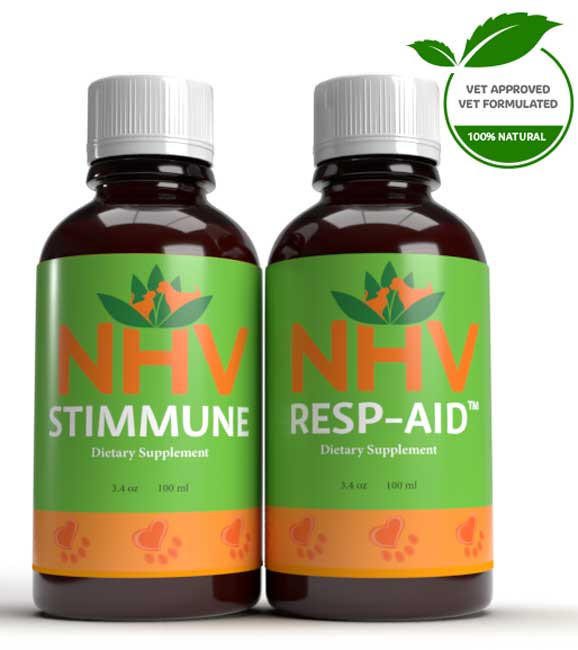
Resp-Aid & Stimmune
bundle and save with pet expert kits
3 month supply for a small to medium size pet
The NHV Kennel Cough Kit contains natural vet-approved dog kennel cough supplements designed to help prevent and manage the symptoms of Kennel Cough. These herbal remedies not only support coughs and respiratory issues, they also balance the immune system.

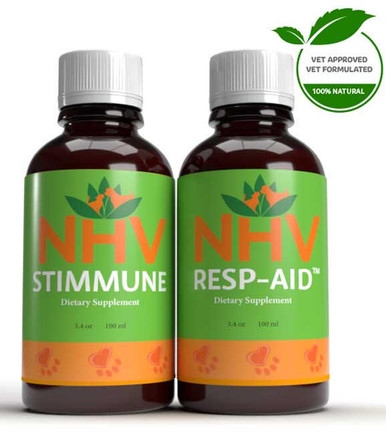
The NHV Kennel Cough Kit contains natural vet-approved dog kennel cough supplements designed to help prevent and manage the symptoms of Kennel Cough. These herbal remedies not only support coughs and respiratory issues, they also balance the immune system.

Kennel cough, is predominately found in dogs and is a respiratory infection caused by Bordetella bronchiseptica, adenovirus and canine parainfluenza virus. These pathogens attack the cilia lining of the respiratory tract causing inflammation of the upper airway, resulting in a cough. This irritation makes your dog susceptible to secondary infection. Kennel cough is extremely contagious. In some cases, the situation may be complicated by secondary bacterial pneumonia. Extra care is required to prevent pneumonia and improve breathing.
When a dog has kennel cough or has been in contact with an infected animal it is just as important to support their immune system as it is to address the symptoms of the cough itself.
NHV Resp-aid is a dog kennel cough supplement that helps to sooth the upper respiratory tract, reduce inflammation, fight infection and ease congestion.
NHV Stimmune combined with the NHV Resp-aid offers the most benefit and support. This herbal formula is a very effective immune booster. Packed full of herbs that have antibiotic and antiviral properties, Stimmune not only boosts the immune system, but also helps to fight and prevent secondary infections that are commonly associated with kennel cough.
RESP-AID
Coltsfoot - Helps control coughing, relaxes spasms and soothes irritated tissue; is an expectorant and has antibacterial properties.
Marshmallow – An anti-inflammatory that controls bacterial infections and soothes and softens irritated tissues.
Plantain – An expectorant that soothes and lubricates internal mucous membranes.
Mullein – Soothes and lubricates tissues.
Horehound – Relieves spasms.
Licorice – A versatile herb that is a fast-acting anti-inflammatory agent ideal for the treatment of respiratory illnesses.
Lobelia – Relaxes and expands the respiratory system to allow oxygenated blood to flow freely.
Ginger – Relieves discomfort and stimulates circulation.
Myrrh – A stimulant that relieves spasms, inflammation, and digestive discomfort.
__________________________________________________
STIMMUNE
Astragalus - Stimulates liver function and improves the immune system.
Echinacea Purpurea – Reduces inflammation and helps boost the immune system and efficiently fight infection.
Oregon Grape – Has antibiotic and immunostimulatory properties.
Asian Ginseng – Improves appetite and increases organic resistance to diseases.
Myrrh – An astringent that relieves irritated skin.
Select your pet's weight to determine the correct dose.
To be taken twice daily. Determine your pet’s weight and then use the easy chart below to determine the correct dose. This is the minimum dosage.
Pet's Weight Dosage
0 - 15 lb = 0.5 ml
16 - 30 lb = 1.0 ml
31 - 45 lb = 1.5 ml
46 - 60 lb = 2.0 ml
61 - 75 lb = 2.5 ml
Over 75 lb = 3.0 ml
For small animals (rabbits, ferrets), avians and reptiles use 1 drop for every 2 lb of body weight.
How to Administer
Shake well before use. The easiest method is to use the dropper provided and place the drops into your pet’s food or favorite treat. You can also use the dropper and squirt directly into the pet’s mouth. Some pets can be finicky, if this occurs consider hiding the drops in foods most pet’s love such as fish, chicken or yogurt or a favorite treat. If your pet only eats dry food then soak a few kibbles at feeding time.
For Best Results
Herbal dietary supplements are beneficial to the health and well-being of your pet and are safe for long-term use. Every pet responds to natural herbal supplements differently, therefore it is important to be consistent and administer the product daily. Supplements generally take two to four weeks to take effect, however this will vary from one animal to the next.
Product Storage
All NHV Natural Pet Products are pure herbal extracts and contain no artificial additives, preservatives or coloring. Shelf life after opening is 6 months and must be refrigerated after opening.
Cautions and Contraindications
Do not use in pregnant or nursing animals.
All information provided by NHV Natural Pet Products is for educational purposes only.
Kennel cough, is predominately found in dogs and is a respiratory infection caused by Bordetella bronchiseptica, adenovirus and canine parainfluenza virus. These pathogens attack the cilia lining of the respiratory tract causing inflammation of the upper airway, resulting in a cough. This irritation makes your dog susceptible to secondary infection. Kennel cough is extremely contagious. In some cases, the situation may be complicated by secondary bacterial pneumonia. Extra care is required to prevent pneumonia and improve breathing.
When a dog has kennel cough or has been in contact with an infected animal it is just as important to support their immune system as it is to address the symptoms of the cough itself.
NHV Resp-aid is a dog kennel cough supplement that helps to sooth the upper respiratory tract, reduce inflammation, fight infection and ease congestion.
NHV Stimmune combined with the NHV Resp-aid offers the most benefit and support. This herbal formula is a very effective immune booster. Packed full of herbs that have antibiotic and antiviral properties, Stimmune not only boosts the immune system, but also helps to fight and prevent secondary infections that are commonly associated with kennel cough.
RESP-AID
Coltsfoot - Helps control coughing, relaxes spasms and soothes irritated tissue; is an expectorant and has antibacterial properties.
Marshmallow – An anti-inflammatory that controls bacterial infections and soothes and softens irritated tissues.
Plantain – An expectorant that soothes and lubricates internal mucous membranes.
Mullein – Soothes and lubricates tissues.
Horehound – Relieves spasms.
Licorice – A versatile herb that is a fast-acting anti-inflammatory agent ideal for the treatment of respiratory illnesses.
Lobelia – Relaxes and expands the respiratory system to allow oxygenated blood to flow freely.
Ginger – Relieves discomfort and stimulates circulation.
Myrrh – A stimulant that relieves spasms, inflammation, and digestive discomfort.
__________________________________________________
STIMMUNE
Astragalus - Stimulates liver function and improves the immune system.
Echinacea Purpurea – Reduces inflammation and helps boost the immune system and efficiently fight infection.
Oregon Grape – Has antibiotic and immunostimulatory properties.
Asian Ginseng – Improves appetite and increases organic resistance to diseases.
Myrrh – An astringent that relieves irritated skin.
Select your pet's weight to determine the correct dose.
To be taken twice daily. Determine your pet’s weight and then use the easy chart below to determine the correct dose. This is the minimum dosage.
Pet's Weight Dosage
0 - 15 lb = 0.5 ml
16 - 30 lb = 1.0 ml
31 - 45 lb = 1.5 ml
46 - 60 lb = 2.0 ml
61 - 75 lb = 2.5 ml
Over 75 lb = 3.0 ml
For small animals (rabbits, ferrets), avians and reptiles use 1 drop for every 2 lb of body weight.
How to Administer
Shake well before use. The easiest method is to use the dropper provided and place the drops into your pet’s food or favorite treat. You can also use the dropper and squirt directly into the pet’s mouth. Some pets can be finicky, if this occurs consider hiding the drops in foods most pet’s love such as fish, chicken or yogurt or a favorite treat. If your pet only eats dry food then soak a few kibbles at feeding time.
For Best Results
Herbal dietary supplements are beneficial to the health and well-being of your pet and are safe for long-term use. Every pet responds to natural herbal supplements differently, therefore it is important to be consistent and administer the product daily. Supplements generally take two to four weeks to take effect, however this will vary from one animal to the next.
Product Storage
All NHV Natural Pet Products are pure herbal extracts and contain no artificial additives, preservatives or coloring. Shelf life after opening is 6 months and must be refrigerated after opening.
Cautions and Contraindications
Do not use in pregnant or nursing animals.
All information provided by NHV Natural Pet Products is for educational purposes only.
Published: October 21, 2021